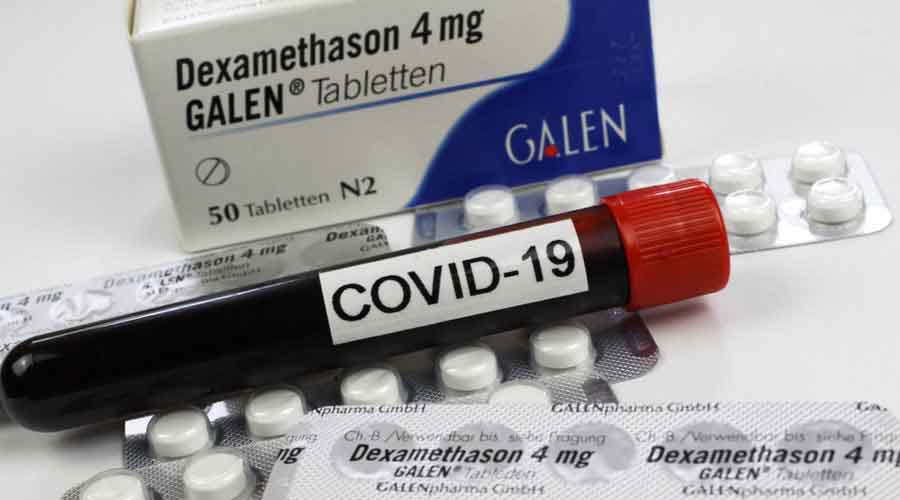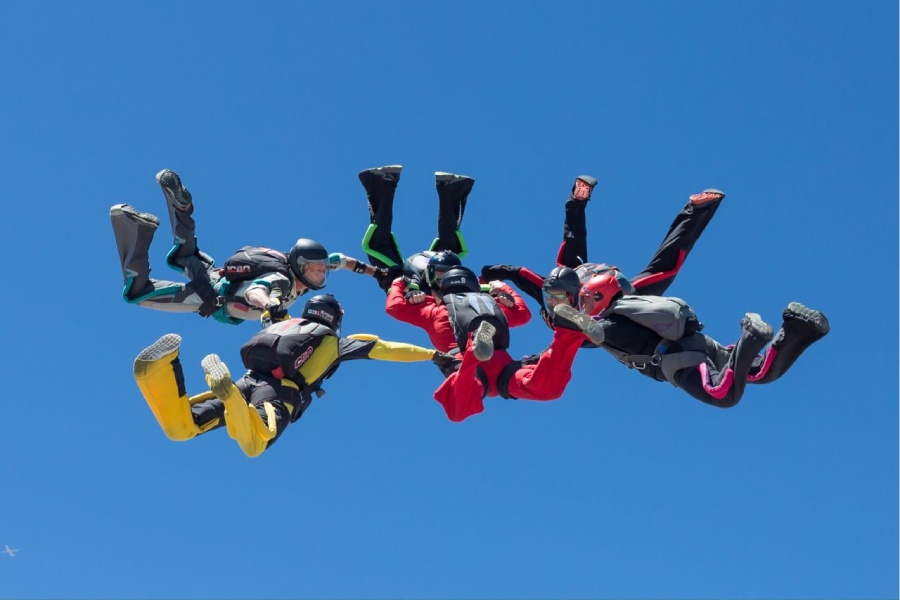India’s health and defence ministries had on May 17 this year launched an oral “indigenous” drug that then health minister Harsh Vardhan called a “potential game-changer” in the fight against Covid-19.
Six months on, there’s still not enough scientific evidence to merit inclusion of the drug, based on the molecule 2-deoxy-D-glucose or 2-DG, in Covid-19 treatment guidelines, experts advising the Centre have said.
A government expert group has desisted from introducing 2-DG into Covid-19 treatment guidelines although the Central Drugs Standard Control Organisation (CDSCO), India’s drug regulatory authority, approved it over six months ago as adjunct therapy for moderate and severe Covid-19 patients.
“The group has not yet found enough evidence on 2-DG to merit inclusion into treatment guidelines,” a senior medical researcher with a central health institution, who is familiar with the group’s discussions on the molecule, told The Telegraph.
The CDSCO had approved 2-DG on May 1, accepting the recommendations of a subject expert committee that had examined the results of clinical trials. However, two doctors who are among advisers to the Centre on Covid-19 and two principal investigators involved in the clinical trials have said the existing evidence is inadequate to justify 2-DG in treatment.
The dissonance between the expert group’s decision to withhold the drug’s inclusion in treatment guidelines and the CDSCO’s approval — which allows drug companies to market the molecule as an anti-Covid-19 drug — has sent contradictory signals to doctors.
“Who do doctors trust — the CDSCO or the expert group? This can erode our trust in the regulatory body,” said Jacob John, professor of community medicine at the Christian Medical College, Vellore. “Doctors expect the regulatory body to weigh all the evidence objectively.”
India continues to detect on average roughly 10,000 new Covid-19 cases daily. Covid-19 epidemiology suggests that 10 to 15 per cent patients could develop moderate to severe disease, although vaccination would have significantly reduced the rates of severe disease.
Many suspect that the subject expert committee and the CDSCO had approved 2-DG in haste while India was experiencing the peak of its second Covid-19 wave, the Centre was under attack for poor preparedness, and hundreds of patients had died after hospitals ran out of oxygen.
“It’s hard to explain the CDSCO’s approval going by the publicly available results of the clinical trials,” said O.C. Abraham, a professor of medicine at the CMC, Vellore, and member of a clinical research group on Covid-19 that was established last year by the Indian Council of Medical Research.
Researchers in the US, India and elsewhere have for over two decades independently investigated 2-DG for its potential anti-cancer activity. And during the early weeks of the Covid-19 pandemic, scientists at the Goethe University of Frankfurt, Germany, discovered through lab studies that 2-DG could suppress the replication of SARS-CoV-2, the virus that causes Covid-19.
In India, a defence lab called the Institute of Nuclear Medicine and Allied Sciences (Inmas), New Delhi, had also for years been studying the anti-cancer properties of 2-DG. Scientists at Inmas last year teamed up with researchers at the Hyderabad-based drug company, Dr Reddy’s Laboratories (DRL), to evaluate 2-DG for anti-Covid-19 therapy through nationwide clinical trials.
When the health and defence ministries launched the “indigenous” drug on May 17, two weeks after the CDSCO approval, Vardhan had hailed the date as a “historic” day in the country’s fight against Covid-19. The defence ministry said 2-DG would provide “immense benefit” to patients suffering from Covid-19.
Inmas and DRL had conducted an initial clinical trial on 110 patients in 12 hospitals, and then a larger trial on 220 patients in 27 hospitals in 10 states. The ministries said the results had shown that the drug reduced hospitalisation time by 2.5 days and the oxygen need by 40 per cent.
A significantly higher proportion of patients (42 per cent versus 31 per cent) who had received 2-DG had improved symptomatically and become free from supplemental oxygen three days after the start of treatment compared with those who had received standard care, the ministries said.
A principal investigator involved in the trials, however, said it was possible that the CDSCO’s approval decision was taken with some laxity at a time when “everyone was looking for something to help save lives”.
“We know 2-DG is absolutely safe,” said Viny Kantroo, a respiratory medicine specialist at the Apollo Indraprastha Hospital, New Delhi, and a principal investigator.
“But we will need more trials, including a rigorous double-blinded study, to determine if it is effective in Covid-19 and whether it should be chosen over other emerging alternatives in the basket of anti-Covid-19 medicines.”
Another principal investigator from a southern Indian city told this newspaper that the 2-DG trials could have had “more rigorous design” such as a double-blinded protocol in which neither the doctors nor the patients would have known who had received 2-DG and who had received standard care. The results of double-blinded trials are considered more reliable than those of open trials.
In recent weeks, the US companies Merck and Pfizer have announced the results of clinical trials on two oral anti-Covid medications that have demonstrated clear evidence --- in a way the 2-DG trials did not — that the drugs significantly protect Covid-19 patients from hospitalisation and deaths.
Queries sent by this newspaper to the CDSCO, DRL and two Inmas and DRL scientists involved in the clinical trials have remained unanswered.
A spokesperson for DRL, however, cited a preprint paper describing the results of the trial on 110 patients. “The teams are working on further submissions of ph3 (the trial on 220 patients) as well and these will be made available in due course,” the spokesperson said.
Satyajit Rath, a senior medical immunologist and adjunct faculty member at the Indian Institute of Science Education and Research, Pune, said the publicly available clinical results cited on 2-DG appear to be limited, going by both the numbers of patients and the results obtained.
“The brag (about a potentially game-changer drug) does not appear well-founded,” Rath said.
Rath and others familiar with the pharmacokinetics — how the body absorbs, distributes, processes and excretes a molecule — of 2-DG say that while 2-DG shows anti-viral properties, other similar molecules might work better as drugs.
A US-based company called Moleculin Biotech had last year taken note of the anti-SARS-CoV-2 activity of 2-DG, as documented by the Goethe University researchers, but worked on a molecule called WP1122 that it says has greater promise than 2-DG.
“Although 2-DG has shown activity against SARS-CoV-2… we believe its therapeutic potential is limited by its inherent lack of drug-like properties,” Moleculin had said in a statement in April this year.
Years of cancer research have suggested that 2-DG is rapidly metabolised in the body and has limited tissue and organ uptake and concentration, the company said.
“We believe WP1122 has the potential to make 2-DG more effective by creating a pro-drug of 2-DG that potentially reaches much higher tissue or organ concentrations than 2-DG alone,” it said.
In October this year, Moleculin received approval for a phase 1a clinical trial of WP1122 on healthy volunteers in the UK from the country’s medicine regulatory authority.
DRL has made 2-DG available through distributors and hospitals across India. Its maximum retail price is Rs 990 per sachet. The company says the drug can be given twice daily — each dose made from one or two sachets, depending on the patient’s weight — for 10 days or until discharge from hospital, whichever is earlier.
India’s Defence Research Development Organisation, the parent organisation of Inmas, has granted licences to other companies to make the product.
Sections of doctors and public health experts say 2-DG is not an isolated example of a contentious approval decision by the CDSCO. The regulator had last year approved two other drugs, favipiravir and itolizumab, for Covid-19 treatment on the basis of limited evidence of efficacy.
Neither drug has been included in the Covid-19 treatment guidelines yet.
“Covid-19 has exposed cracks in our regulatory system,” said John, the community medicine specialist at CMC. “Doctors are taught that evidence-based medicine is critical. But what do we do when the regulatory authority doesn’t appear to adhere to that principle?”











